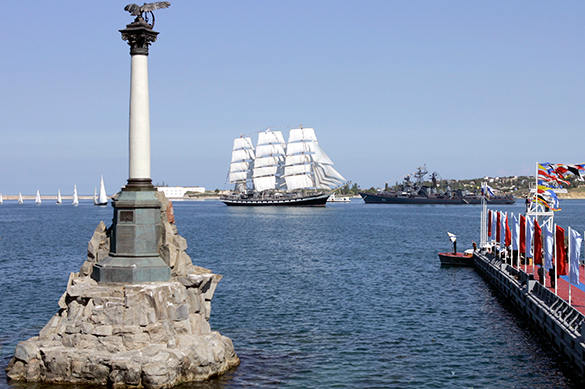Sevastopol: Pearl of Russia is shining brighter
Sevastopol is a city of federal significance, a hero city, the main base of the Black Sea Fleet and a pearl of Russia's Crimea. Pravda.Ru editor-in-chief Inna Novikova sat down with Sevastopol Governor Sergei Menyailo to talk about the development of the city for the upcoming 20 years, about the consequences of the information war against the Crimea and Russia, as well as about investment issues in the development of Sevastopol and the entire peninsula.

"March 16 will mark two years since Crimea became a part of Russia. This event still remains the talk of the day for the "civilized world community." In the West, many believe that Russia forced Crimean leaders to sign everything at gunpoint. Why is it so hard for objective information to come through?"
"There are some people, who do not want this to change. An information war is going on against Russia, and they are trying to distort the truth. A recent poll showed that 96 percent of Sevastopol residents support its decision to reunite with Russia. Yet, there are powerful forces that are purposefully working against us, against Russia. I come across this when foreign delegations visit the region."
"You saw 36 foreign delegations last year, didn't you?"
"Yes, there were Italians, French, and many others. They were very surprised not to see armed people in the streets here. They came convinced that the Crimea was an occupied territory under a military regime with arrests and inspections happening all the time. The Crimea and Sevastopol are the reasons to continue the information war against Russia."
"Ukrainian media keep writing that all Crimeans complain and massively flee to Ukraine, that Sevastopol lies in ruins and dirt."
"Well, objectivity and Ukrainian media are incompatible. How can one destroy everything in two years if nothing was destroyed in 23 years? You need to bulldoze everything to do that. Nothing new has been built during that time. The West does not want to see Russia as a strong nation - they need to see Russia the way it was during the 1990s. Back during those days, the West was great friends with Russia, because we used to be the country that they could command. As soon as Russia started rising, the friendship was over.
"Russia has made two very important steps recently. The first one was the Crimea and Sevastopol, and the second one was Syria. The Americans want to decide everything single-handedly, even though nothing good comes out of it."
"Is it hard to work and cooperate in these conditions? Are there problems with investors?"
"There are problems with investors indeed. Yet, we must not depend on anyone else's wishes. In Sevastopol and the Crimea, we have created and still try to improve conditions for investment. In late 2015, we registered the 100th resident of the free economic zone in one year. The economic zone really works. The total volume of investment in one year made up 4 billion rubles."
"Do you have a development plan for 10-20 years?"
"We have ordered documents for the General Development Plan of Sevastopol. We understand the need to develop traditional industries in the region, such as viticulture and wine-making, growing fruit and vegetables, gardening.
"In Sevastopol, of course, there are many important enterprises of the military-industrial complex. Most of our companies work directly or indirectly with the military-industrial complex - it goes about shipbuilding in the first place. Of course, there are problems that need to be looked into, but we have to do everything from scratch now, because we were out of the Russian legal field.
"Residents of Sevastopol are ready to tighten their belts - the people understand that they need to wait. There is no critical situation, not even with electricity, and we are all part of this process, including small business. Other regions of Russia help us, Moscow helps us in time of need. After all, we have been in the Russian legal field for a very short time, but many believe that we are already a stable and well-established subject of the Russian Federation.
"We need to invest not only in infrastructure and industry, but also in people, in prestige and mentality. This work takes a lot of time and energy. We saw economic growth last year, when factories started working. As a result, we have achieved the growth of almost 41 percent."
Interview conducted by Inna Novikova
Pravda.Ru
Read article on the Russian version of Pravda.Ru
Subscribe to Pravda.Ru Telegram channel, Facebook, RSS!





